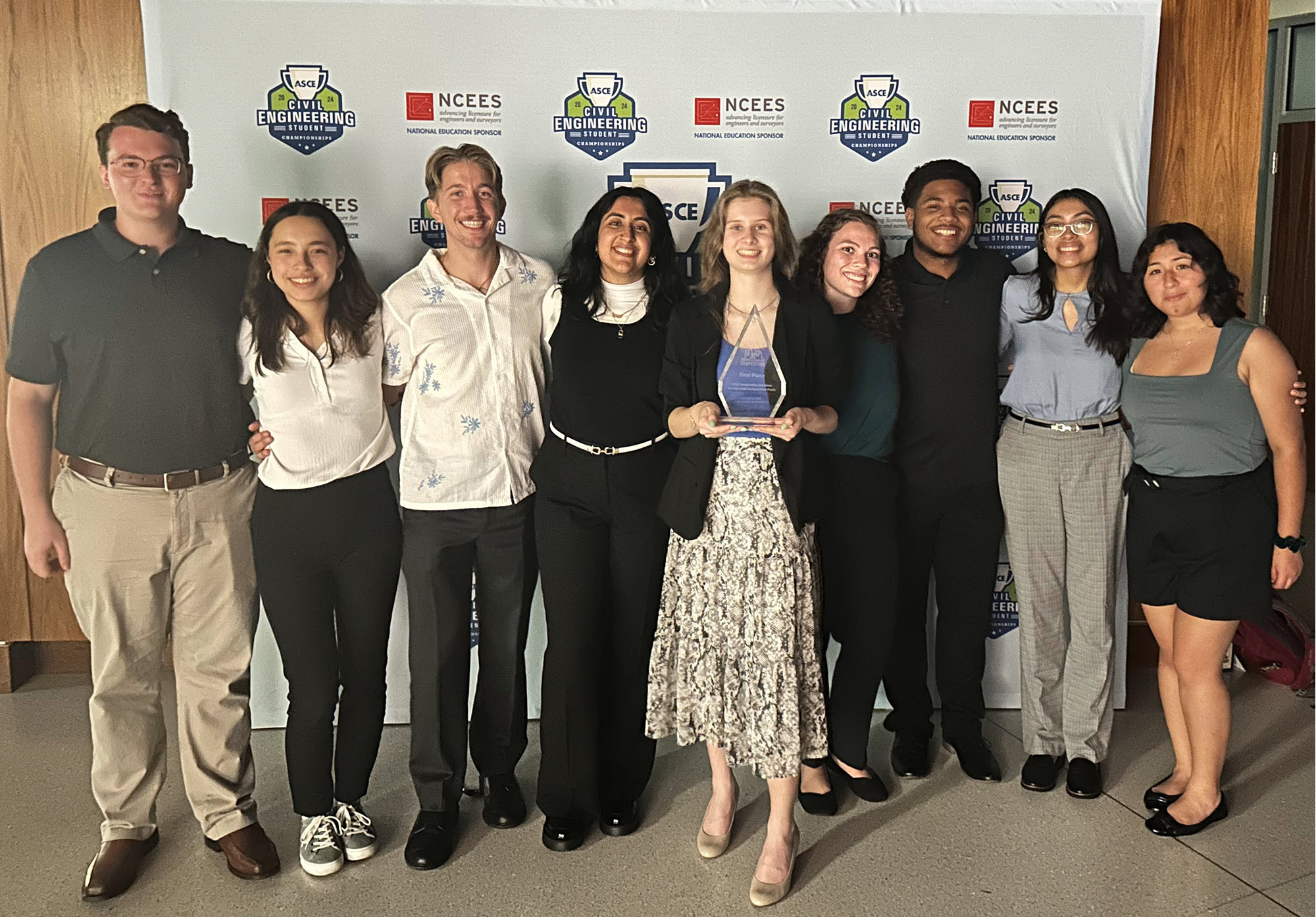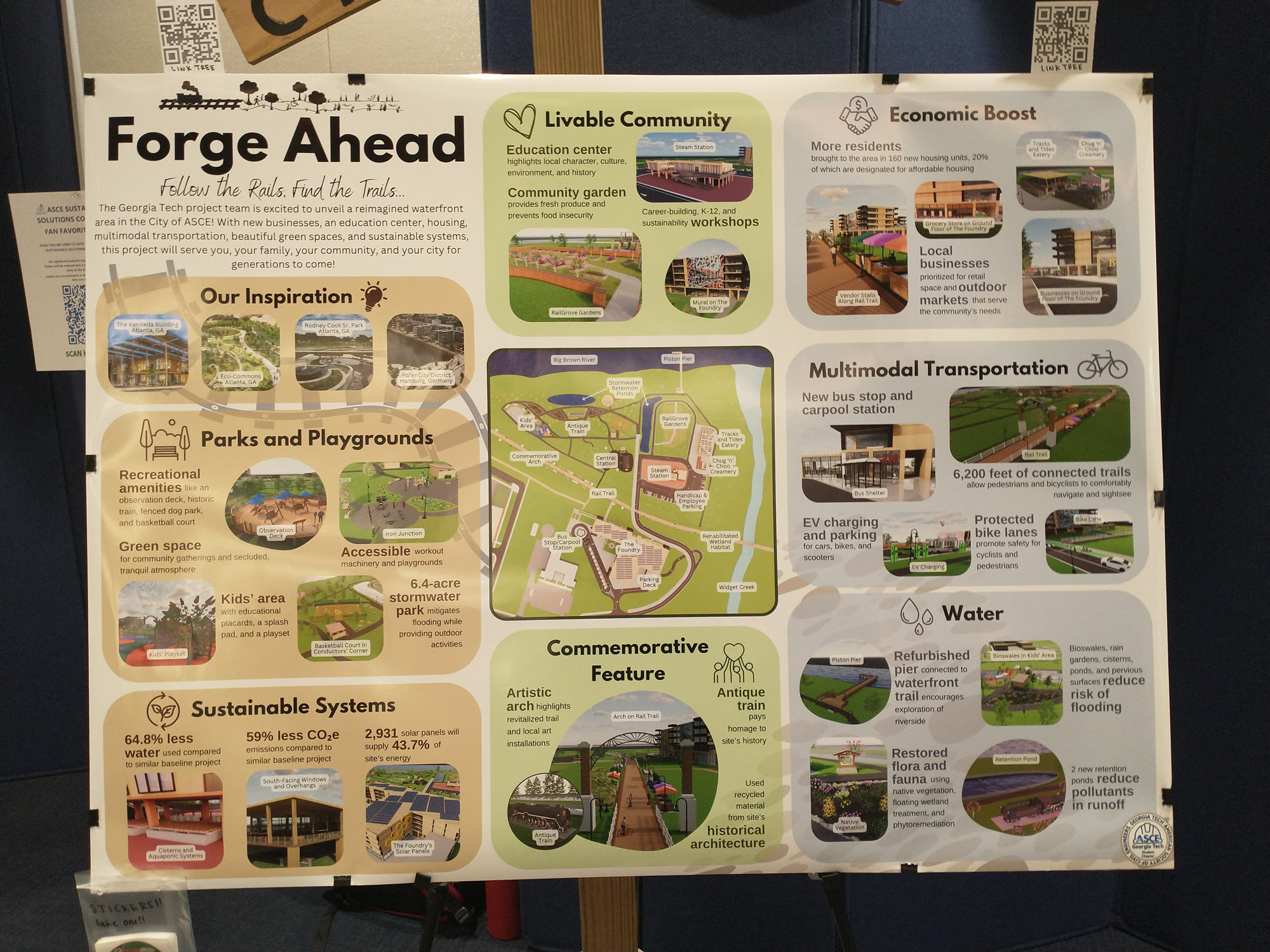 Mary Helvie
Mary Helvie Being nervous about something is a good thing. It means you care, right?
Well, assuming that nerves-to-caring ratio is correct, the Georgia Tech student team competing in the ASCE Sustainable Solutions Competition finals last month must have cared a lot.
The tension was running high as they gathered to learn the competition results during the awards banquet that closed the 2024 ASCE Civil Engineering Student Championships this weekend at Brigham Young University in Provo, Utah. Having won the competition in 2023, Georgia Tech was the defending champion, but was its 2024 performance good enough for a repeat title?
“We were all really, really nervous,” said Mary Helvie, the Georgia Tech captain, who was also a member of last year’s championship team. “The teams were all really good this year. So we were nervous, all sitting together, holding hands, and just closing our eyes.”
The way the ASCE Student Championships awards banquet works is that the various competition final standings get announced in inverse order – meaning the Sustainable Solutions overall first-place winner is the last team called.
So the Georgia Tech students are holding hands, closing their eyes, and the third-place team gets awarded: Boise State University. The nerves continue.
Now it’s time for the second-place team announcement: Virginia Tech. Still nervous but also possibly excited? You can’t be first if you’re in second or third place. And then …
“First place gets called, and we all jumped up,” Helvie said.
It was indeed Georgia Tech as repeat winners of the ASCE Sustainable Solutions Competition finals.
“We were all screaming,” Helvie said. “I’ve never felt my heart pounding like that – like ever.
“And then we all ran down to receive our award, and it was just the most … I don’t know how to describe it. We’d been working on this for so long, and of course, we wanted to win. But just to know that our hard work really did pay off in the end, it was amazing.
“We were all there together, and it meant so much to all of us. It was such a collaborative project that we put together, so it was really exciting to have that moment together where we all ran to go get the award.”
The ASCE Sustainable Solutions Competition is one of three Society-wide student competitions – along with concrete canoe and the ASCE UESI surveying competition – that have championship finals at the annual ASCE Civil Engineering Student Championships.
This year’s Sustainable Solutions competition challenged students to develop a creative, sustainable waterfront revitalization for the fictional City of ASCE.
The city, we’re told, was well known for its early 20th-century waterfront and manufacturing hub on the Big Brown River. However, over time, the waterfront declined and eventually was left mostly abandoned. Now, city leaders are seeking proposals to revitalize and redevelop three parcels of the waterfront area using the Institute for Sustainable Infrastructure’s Envision framework to meet the sustainability goals.
This is where the student teams came in.
 Mary Helvie
Mary Helvie “This year the site was a lot bigger than last year’s challenge,” Helvie said. “Then, because it was an abandoned industrial site, there was contamination, and it was in a floodplain.
“So there was a lot to consider. We had a lot of professors and industry professionals come and talk us through it.”
The main hangup for the Georgia Tech students was the floodplain. What to do with the floodplain? The breakthrough came when they stopped trying to avoid the floodplain and instead began to embrace the floodplain.
“One of our professors told us, ‘You’re not going to stop the flooding. That’s not really possible,’” Helvie said. “That gave us the idea that our buildings should work with the flood rather than against it. So we decided to do a stormwater park that is similar to the EcoCommons on the Georgia Tech campus, where it’s a place for people to gather and enjoy nature.
“We elevated our buildings so that the area could still be flooded underneath. They’re allowing the flooding to naturally occur without feeling like we’re building a wall to keep it out.”
Georgia Tech, Virginia Tech, and Boise State finished as the top three schools in the overall standings. In the fan-favorite categories, Montana State University earned the Most Livable Site award; and Boise State won both the Best Sustainability Features award and the Best Waterfront honors.
As the teams return home, they’ll start internships and new jobs. Interestingly enough, Helvie is a structural engineering student. They tend to find their way more into the concrete canoe or steel bridge competitions. But Helvie said she likes the Sustainable Solutions Competition’s combination of disciplines.
“You have to do the transportation; you have to do the water management; you have to do the community aspect; you have to do the building layout and site planning,” Helvie said. “It’s some of everything, and it really shows how projects are never going to be just a structural engineer talking to a structural engineer. It’s going to be the structural engineer talking to the architect, talking to the client, talking to the contractor. There’s so much more than just one person or one type of specialty on a project.
“I think that’s something we’ve learned.”
Helvie is set to graduate in December and plans to continue her graduate studies at Georgia Tech. She’s interning at a structural engineering firm in Georgia this summer and brings a wealth of experience from the Georgia Tech Sustainable Solutions championship team.
“I feel like the biggest thing structural engineers can do is rehabilitate existing structures so that we’re not always building completely new buildings,” Helvie said. “Even if people say, ‘There’s not really anything you can do.’ I think there is. “Sustainability is something I’ve always been passionate about, and it’s something I want to incorporate into my career.”
The ASCE Civil Engineering Student Championships was made possible with funding from the ASCE Foundation.
Learn more about the 2024 ASCE Civil Engineering Student Championships.



